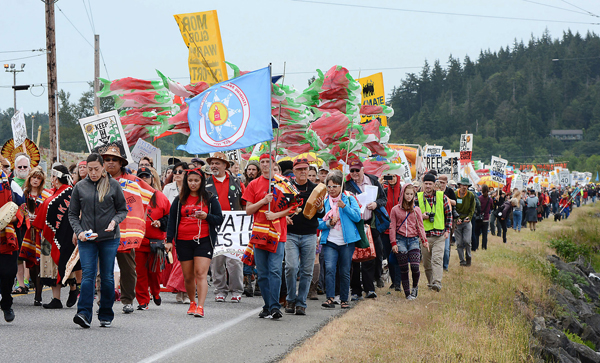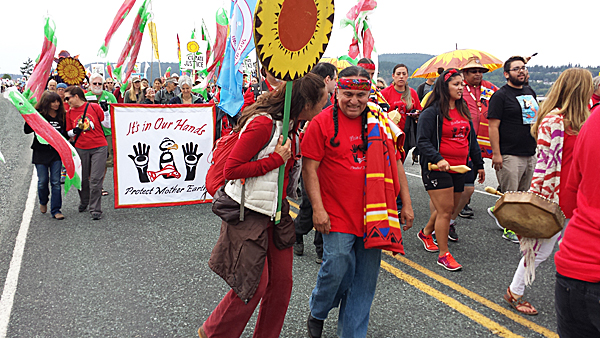52 Arrested for Blocking Oil Refinery in Washington State
May 23, 2016 | Revolution Newspaper | revcom.us
 One thousand people came to Anacortes from Portland, and from the states of Oregon, Washington and Montana. Students who had been fighting for their colleges to divest from fossil fuels, and others who shared a deep desire to save the planet joined the colorful protest led by indigenous people from around the area, marching past two refineries.
One thousand people came to Anacortes from Portland, and from the states of Oregon, Washington and Montana. Students who had been fighting for their colleges to divest from fossil fuels, and others who shared a deep desire to save the planet joined the colorful protest led by indigenous people from around the area, marching past two refineries.
(Above: AP | Below: Special to Revolution/www.revcom.us.)

On May 15, 52 people were arrested after blocking oil-train tracks into the Shell and Tesoro refineries in Anacortes Washington, part of worldwide actions to Break Free from Fossil Fuels to combat global warming. People also blocked oil-train tracks in Albany, New York, and more than 40 people were arrested after trying to block British Petroleum’s Whiting Refinery near Chicago. And from May 3-15, there were actions on six continents, including large marches in the Philippines and actions in Ogoniland in Nigeria, where people have fought for decades against deadly oil spills and contamination of their land and waters. Major fossil fuel projects were temporarily shut down or disrupted including in Australia, Brazil, and Germany as well as the actions in the U.S.
People came to Anacortes from all over the region—from Portland and elsewhere in Oregon, from around the state of Washington, and carloads from Montana. There were numbers of students who had been fighting for their colleges to divest from fossil fuels. Among many there was a deeply felt desire to save the planet. Revolutionary communists were in the mix, joining in resistance, connecting people with Bob Avakian, with revcom.us, and getting into discussions.
Weekend actions in Anacortes featured a colorful protest of 1,000, led by indigenous people from around the area who marched past the two refineries near March Point. A speaker from the Swinomish tribe pointed out that this land was unceded—stolen from the native people—and that where once the people took food from the sea, now the waters were too polluted to harvest. Various tribes came together, and in speeches and ceremonies invited people to learn about their cultures, and spoke strongly of the need for resistance and determination to protect the waters and sea life. A highlight was the arrival of a large and beautiful native canoe as part of welcoming people. A theme brought out by several of the native people was that we are all one people, worldwide.

Right-click here to download
Pamphlet (PDF)
Brightly colored protest kayaks—famous worldwide from the protests blockading a Shell drilling rig bound for Arctic waters—were in the waters around the rig during the day and at night.
And beginning Friday night, May 13, about 150 people swarmed a section of railroad track that brings oil into the refineries, including highly explosive Bakken shale oil from the Midwest. They chained vehicles to the tracks, and erected structures, flags, banners, and tents on the tracks—all visible from the adjacent highway. Early in the morning on Sunday the 15th, protesters were awakened by heavily armed riot police with guns drawn surrounding them. It was at this point that 52 people refused to leave the tracks and were arrested. The blockade had an inspiring effect on the protesters, and became a big topic of discussion among local people around Anacortes, as well as in both national and international press.
These actions took place at a time when climate scientists declared a climate emergency earlier this year due to temperatures that are smashing records and threaten already to go beyond 1.5 degrees Celsius—set as the aspirational goal of the Paris climate talks, beyond which lays larger-scale catastrophe. Carbon emissions have grown steadily, with April 2016 as the 12th straight hottest month on record.
Volunteers Needed... for revcom.us and Revolution
If you like this article, subscribe, donate to and sustain Revolution newspaper.







